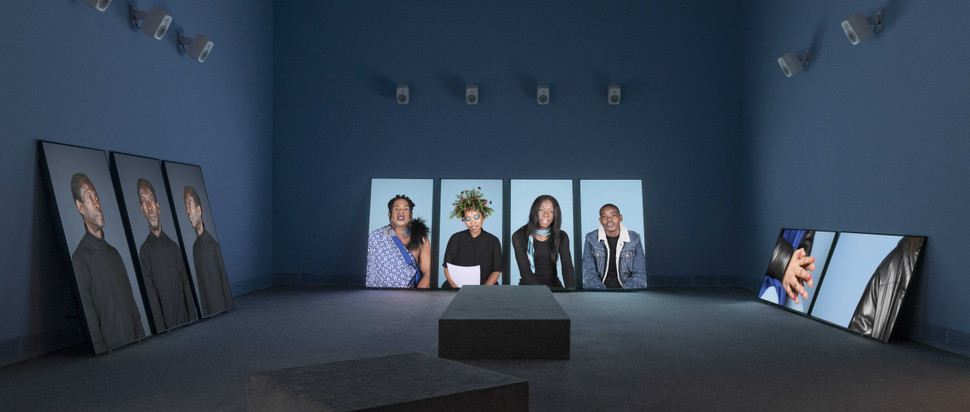Gabrielle Goliath on new exhibition Personal Accounts
We meet Gabrielle Goliath, the artist behind Personal Accounts, a decolonial and collaborative project of repair now on show at Talbot Rice Gallery in Edinburgh
Personal Accounts is a deeply immersive and contemplative series of video and sound works, where Johannesburg-based artist Gabrielle Goliath addresses the global normativities of gendered and racialised violence and its impact on survivors. Goliath worked in close collaboration with survivors and allies transnationally in Johannesburg, Tunisia, Oslo, Milan, Stellenbosch and now, for the exhibition at Talbot Rice, Edinburgh. Fresh from representing South Africa at the Venice Biennale with a rendition of Personal Accounts, Goliath tells us more about how she is using her platform at Talbot Rice to investigate these concerns.
I’ve seen artworks by Sue Williamson in which she has done something that looked on the surface kind of similar to yours – by way of the media used and where she gets victims and perpetrators (sometimes perpetrators of injustices during the Apartheid era) to talk about the same subect matter. Would you describe her as an inspiration?
Well, I wouldn't necessarily cite Sue Williamson as a precedent but rather, I look to a chorus of extraordinary black, brown femme and queer scholars, and practitioners who are really tackling head on a regime of representation itself inherently raced, classed and gendered, so a work such as Personal Accounts, as with all my other works really looks to tend and attend to the laundry of the social catastrophes of slavery, of colonialism and Apartheid. But of course, the ways in which we continue to inhabit the aftermaths of those catastrophes, and it shapes and informs all of our lives, and in actual fact, resultantly produces a differentially valued life. And so that is the bedrock to my entire practice.
Have you collected participants’ thoughts on the process or the film depicting them?
I think it's been really important to think about how the work is produced right from the beginning. It’s produced in community and in dialogue with many, many individuals and partner organisations, so the preface to the making of this work is highly relational, and it's my way of seeking to work in a subject-centred, ethical mode of art-making that is extractive or ethnographic to some degree. And so in making my work, I look to firstly make sure that I put in place these relationships, friends, friendships, partnerships that make possible a way of me being held to account and of course being accountable to those who get involved in the work, from partner organisations such as the Talbot Rice Gallery to the collaborators that are assembled within a particular context. They are made very much aware of what this work is about and invited to participate. And so those conversations are really quite key.
Personal Accounts is really centering around the experience of the survivor. One really then does need to think quite carefully about that particular subject position. I looked to untether them from the really reductive, problematic frame of victim and victimhood, but in actually exceeding that so regularly the terms of engagement, the terms of participation have political, affective, poetic and aesthetic implications.
Would you say you gave up authorship as the artist with the initial concept to some degree in Personal Accounts?
Personal Accounts is very much driven by the agential capacity to give or to withhold. There are those who participate in this work who may be striving towards visibility as trans activists, for example. They want to be visible in the work they are in. There are those who choose to withhold and not disclose their identity. All of these decisions are so important and significant for each one of those individuals. And I think that’s what the work really grapples with. It's this idea of giving an account and accounting for oneself, and the voice of the survivor is one that is so regularly discredited.
That makes sense. I like how daring it is to only let the audience hear sighs and filler words – but what do you think about those that might feel that you're redacting the collaborators’ monologues and silencing them?
Well, I think firstly, it's really important to note that it is a consented-to decision. So that's really important. And then of course, as I say, it's this grappling with this so-called dichotomy of those who have a voice and those who do not. And what this work is really asking of those who come to it is to consider what happens when we forego lexicality. What happens within that paralinguistic space? And I think it's really important to grapple with this idea of so-called transparency. That language apparently affords us to be known and transparent to one another, but in actual fact, rather to claim a form of opacity. I'm very careful around the languaging as well of the work. This is not about editorial censorship, redaction, or a cut, all of which implies a form of conceptual and aesthetic and material violence, but in actual fact, this is driving towards an alternative, a different kind of aesthetic encounter. Also, it’s important to note, this is not a work about physical violence. These are not all solely accounts of violence and so this is not work that is asking for only victims to come forward. So that's a really important aspect.
Personal Accounts, Talbot Rice Gallery, Edinburgh, until 15 Feb
